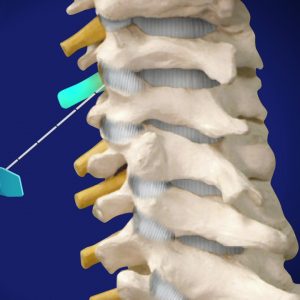
Diagnostic selective nerve root blocks, or SNRB for short, are injections that treat inflammation of a spinal nerve. This treatment is performed with the use of an anesthetic medication, sometimes including a steroid that is injected by the spinal nerve area near opening in between neighboring vertebrae. The purpose of this nerve root block’s medication is to minimize inflammation and numb the pain sent by that nerve.
If you feel pain in your back, numbness or a tingling sensation in the lumbar portion of your back, you might have a pinched nerve. Numbness that extends all the way to your buttocks is another clear indication of a pinched nerve that can be treated with a diagnostic selective nerve root block. Furthermore, if the numbness moves all the way down to your legs and feet, it is a clear indication that you need prompt medical treatment that might include a diagnostic selective nerve root block. Legs that feel weak and/or a pain that worsens when laughing, coughing, or simply moving your back are also indications that a nerve root block should be considered.
The purpose of the nerve root block is to reduce pain. If the injection eliminates your pain, it serves as verification that the nerve in question is the actual cause of the problem. The doctor might provide a subsequent injection or multiple injections as time progresses. Most patients enjoy a significant pain reduction after the diagnostic selective nerve root block. However, if this treatment modality does not relieve pain after several injections, the doctor will discuss the potential for other treatment modalities as well as surgery.


Herniated discs have the potential to cause nerve root inflammation. Bone spurs and other degenerative changes within vertebrae can also lead to nerve compression. Nerve root block injections are used to treat such nerve inflammation, compression and conditions including scoliosis.
There might be nerve pinching or chemical irritation if such conditions exist because of the mechanical compression of the nerve. Don’t lose hope if the initial nerve root block does not improve your condition. If several nerves are the root cause of your pain, subsequent nerve root blocks will be provided.
Nerve root blocks that are lumbar selective pinpoint specific spinal nerve roots that cause pain. However, the underlying pain might stem from a spinal nerve root disease, a ruptured disc or nerve compression. Even spinal stenosis that leads to a narrowing of the spinal cord and subsequent pressure applied to nerves has the potential to be the true cause of the pain. Our doctor is here to determine the specific cause of your discomfort and act with a diagnostic selective nerve root block or another treatment modality.
Every patient should be aware of the slight risks of nerve root block injections. This injection has the potential to cause bleeding, an allergic reaction, infection, and other side effects. However, most patients experience temporary muscle weakness after the injection that quickly fades away soon after.
If you believe you could benefit from an occipital nerve block, come visit the experts at Principal Spine today. Our pain management doctors are accepting new patients to schedule and appointment, please call our Carrollton clinic at (972) 316-7270 or our Denton clinic at (940) 222-8943.